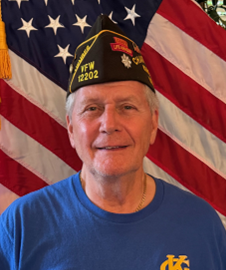
Chris Werle
Judge Advocate - Army
Christopher Werle, Lieutenant Colonel, US Army, Retired, was born in Newport, R.I., on November 3, 1949. The son of a career US Navy officer, he grew up in the Virginia Beach, VA area and has lived and worked the majority of his life in Virginia. In 1971, he was commissioned a Second Lieutenant, Corps of Engineers, in the US Army as a distinguished military graduate from the ROTC program at Virginia State College, and served on continuous active duty for 21 years. His final tour of duty was on the Army Staff in the Pentagon, where he helped manage the Army’s $1.2 billion world-wide environmental program. He retired from active duty in June 1992, and then worked as a defense contractor in the environmental field for another 26 years before retiring again in September 2018.
During his years of active military service, he undertook various command and staff assignments in the continental United States and overseas. In particular, from April – October 1991, he served during the Persian Gulf War as the senior environmental staff officer with the Defense Reconstruction Assistance Office (DRAO), Kuwait City, where he oversaw Department of Defense (DoD) environmental program support for the reconstruction of Kuwait. In that capacity, he monitored all environmental issues impacting operations and mission accomplishment and advised the DRAO Commanding General accordingly. He also performed simultaneous functions for the United States Ambassador to Kuwait.
In addition, he served as the DoD liaison officer to the Red Adair Company and other firefighting teams from the United States, Canada, and several European and Asian nations involved in the effort to extinguish, kill, and cap more than 730 oil wells that had been blown up by retreating Iraqi forces during the war. In this capacity, his contributions included using an Army Combat Engineer Vehicle (CEV) to fire demolition rounds to blast and safely remove coke mounds from burning wellheads; designing a 300-lb field expedient plastic explosive shaped charge for use in removing damaged wellheads; and helping an Army explosive ordnance disposal (EOD) team stabilize, remove, transport, and safely detonate an unexploded bomb that had inadvertently landed inside one of the oil field gathering centers.
He also facilitated the efforts of numerous international health agencies to study the health impacts of the oil-well fires, to include the US Environmental Protection Agency, the Centers for Disease Control, the National Oceanic and Atmospheric Administration, the National Institute of Standards and Technology, and the US Army Environmental Hygiene Agency. His work expedited the selection of sampling equipment; the collection of thousands of air, soil, and water samples; and the installation of an 18-station computer-based monitoring system that enabled the Kuwait Department of Environment to make daily health alert forecasts related to overall air quality.
His military awards and decorations include the Legion of Merit, Bronze Star Medal, Defense Meritorious Service Medal, Army Meritorious Service Medal (3 awards), Army Commendation Medal (3 awards), Army Achievement Medal (2 awards), Humanitarian Service Medal, Southwest Asia Service Medal with one campaign star, Kuwait Liberation Medal, Army Superior Unit Award, Army Staff Identification Badge, and the Parachutist Badge.
